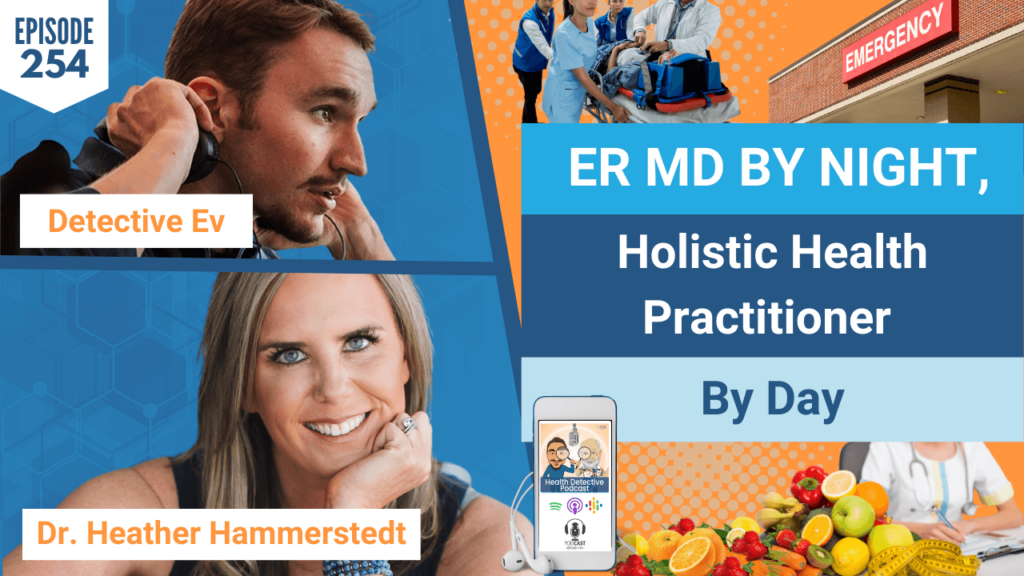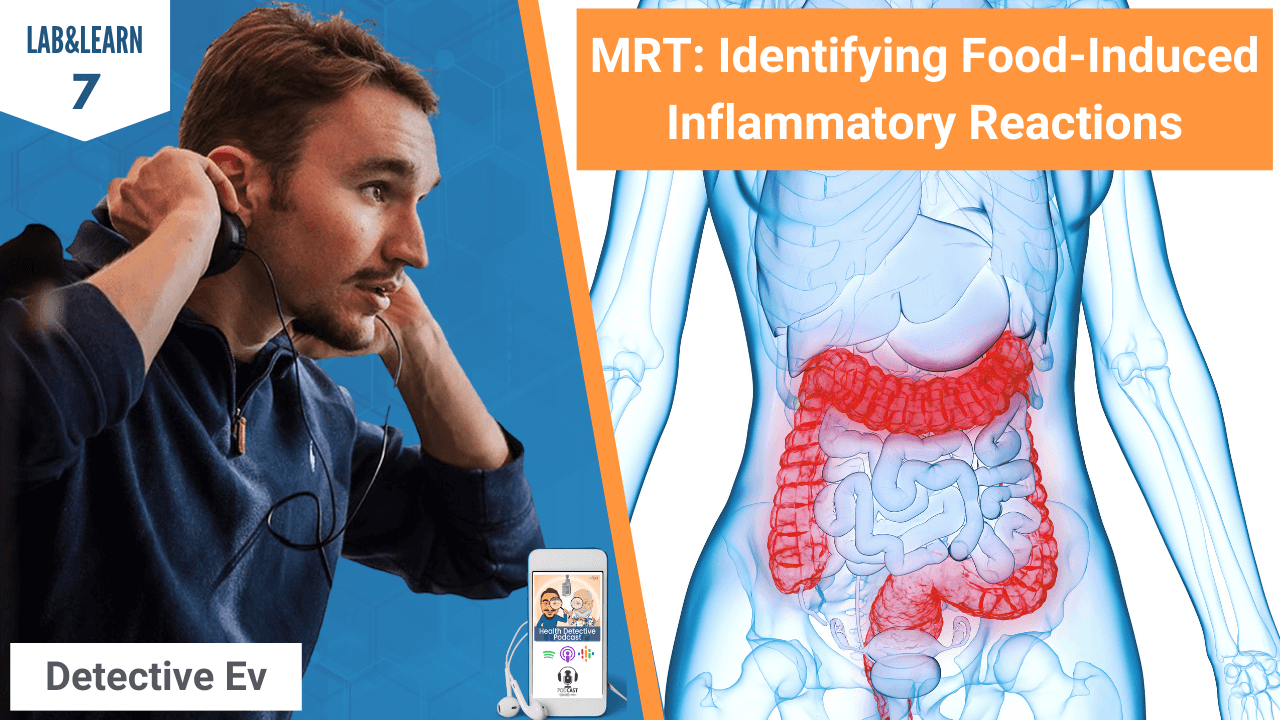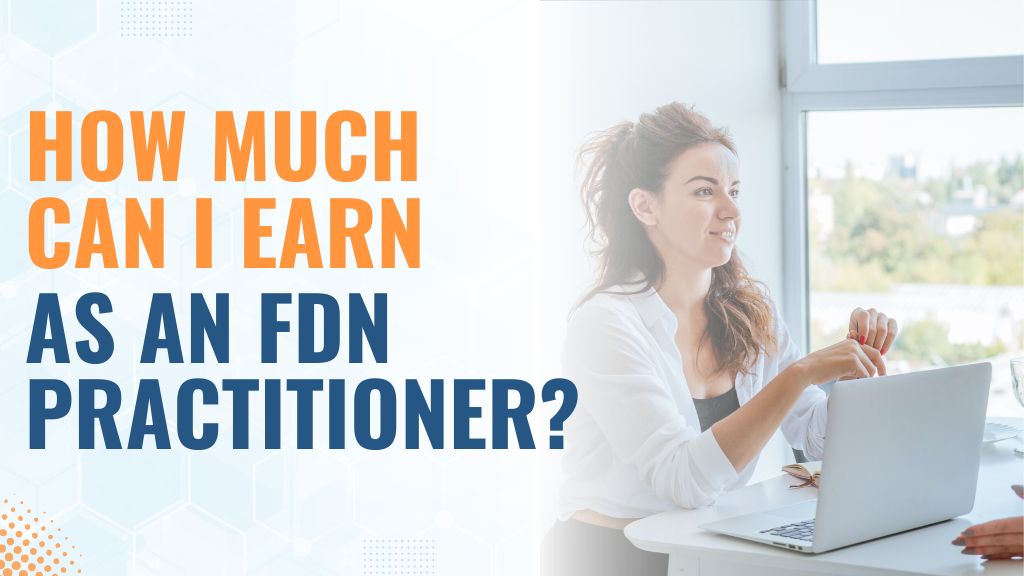Introduction
Well, hello my friends. Welcome back to another episode of the Health Detective Podcast by Functional Diagnostic Nutrition. My name is Evan Transue, aka Detective Ev. I will be your host for today’s show about an ER MD slash Holistic Health Practitioner. Without further ado, let’s get to today’s episode.
How are you and welcome to the Health Detective Podcast.
[00:00:41] Dr. Heather Hammerstedt: I’m great today. Happy summer.
[00:00:43] Detective Ev: Yeah. Thank you. I’m definitely enjoying it here.

We were actually just talking, it’s always a small world. We’ve interviewed people from all across the world like Europe. We’ve had Canada, Australia, and I think even a couple of people in South America as well. And then, go figure, Dr. Heather actually grew up in Pennsylvania where I live and grew up.
Then she went to college literally an hour, well, you went to a few different places, but one of them was Temple University, and that’s only about an hour away from me. I live in an area where like half the people go to Temple and half the people go to Penn State.
Dr. Heather Hammerstedt: Yeah, and I did both.
Detective Ev: Yeah, it’s kinda one or the other here. And then, very cool that she currently is in Boise, Idaho. I got to go there for the first time for FDN, of all things, in May. And man, that’s a cool place. That’s the perfect mix of city, but not overwhelming. Like I can do that. But you did warn us that people are stacking in.
[00:01:33] Dr. Heather Hammerstedt: A lot of out-doorsy stuff here for people who are nature lovers.
An ER MD: Working Together
I was just coming into my garage before I was coming in to meet you and I was looking around. And I was like, okay, there’s a whitewater raft, four kayaks, two paddleboards, and like six spikes. This is a classic Boise garage right here.
[00:01:51] Detective Ev: Yeah. And that’s up me and my girlfriend’s ally. I have a goal to hit the highest point in every state before I check out of here. So, I know that one is Bora Peak, I believe.
Dr. Heather Hammerstedt: Yes.
Detective Ev: If I’m saying it right. So, I can’t wait for that one. Obviously, not the point of the podcast.
We’re here to talk about some health stuff and you got a rather extensive background. I tell you this off air, but I also like to reiterate this to the audience. I like to go into the interviews with a healthy level of ignorance. Not so much that I can’t ask good questions but just enough that it’s truly an organic conversation. I think those make for the best podcasts.
And when I was reading your bio, you’ve been doing this for a while, even the coaching side, which many people would look at as a bit newer. It seemed like you had almost covered two decades of that, so we’ll have plenty to talk about today.

I’d love to know first how you got into the medical route. Something I’m passionate about is bridging Western and functional, or natural, whatever you want to call it, medicine together. Because somehow each side believes the other side’s out to get one another. I’m thinking, wouldn’t it be smarter if we all just worked together to get the best client and patient outcomes?
An ER MD: The Idea of Food is Medicine
So, I’m guessing you didn’t get into normal medicine because you’re a sadistic person that wanted to hurt people. I’m guessing you did it cause you’re probably intelligent and wanted to help. How did that career path start?
[00:03:06] Dr. Heather Hammerstedt: Well, first of all, the summary is that I have realized over now about 20 years that we don’t know anything in any sort of way. We don’t know everything in politics or in finance. We don’t know everything in medicine or in alternative medicine. I think it’s smarter to realize the things we don’t know may have an answer later that we just don’t understand now. And so, yeah, I totally agree; working together is better.
I can give you my story. So, I think when I was five or six, I remember sitting in the grass and thinking, I’m just going to be a doctor. And no one in my family had ever been a doctor. I don’t know where that came from. But I think it was solidified when I was 14 and my boyfriend told me that girls couldn’t be doctors. I’m super stubborn so I’m pretty sure that that is actually why I stuck through like 20 years of training.
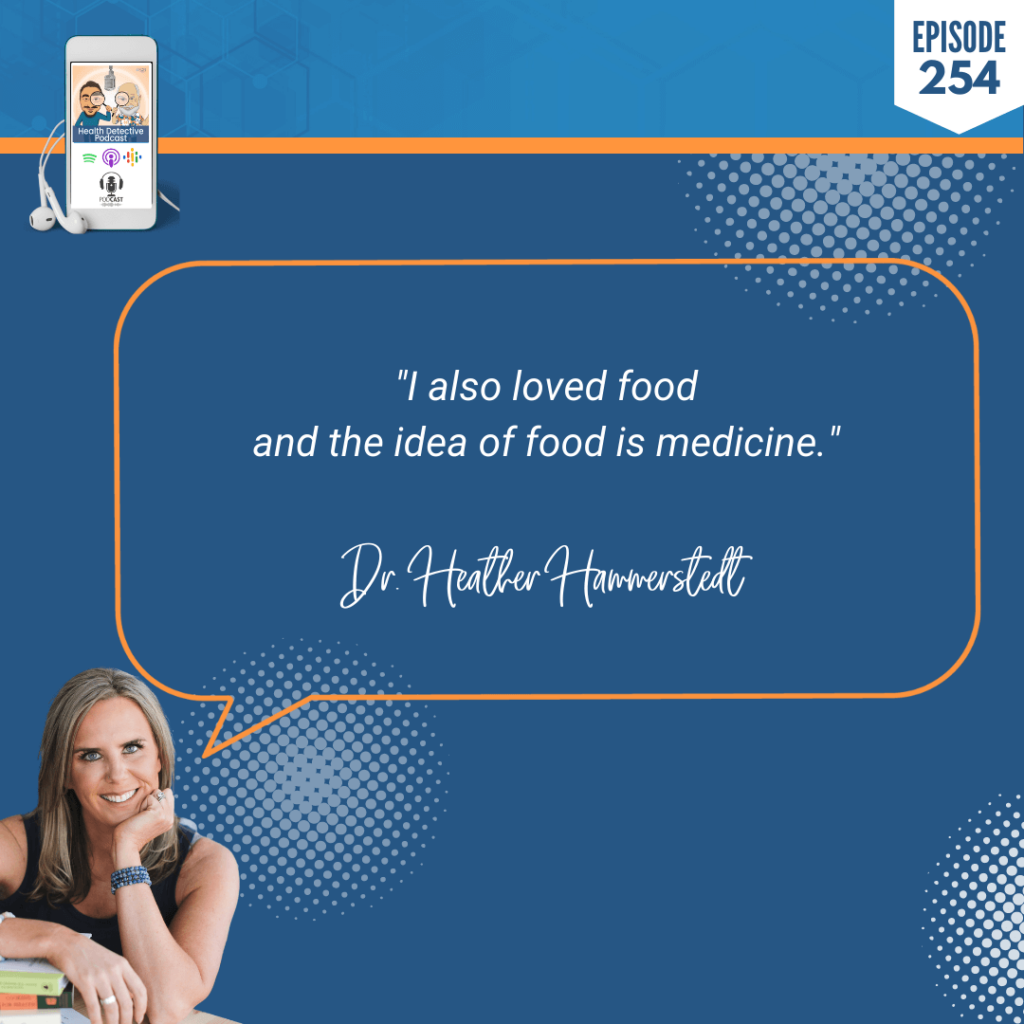
But in all seriousness, through college, I was a biochemistry undergraduate major, and I love the details of cells and chemistry and how things work together in our bodies. I also loved food and the idea of food is medicine. I got into medical school, and I feel like I went in there clutching Paul Pritchard’s book that is Healing with Whole Foods from a traditional Chinese medicine perspective. And I really went in thinking I was going to learn nutrition and movement and all these things.
An ER MD: Lifestyle Medicine
We had like a half an hour lecture on nutrition. The whole time it was based on diabetes, which is very important, don’t get me wrong. But like my understanding of how all the hormones worked with digestion was based on disease processes.
And so, when I was a third-year medical student I enlisted in the Institute for Integrative Nutrition, which is in New York. I was in Philly at Temple, as you said. And at the time it was an in-person yearlong program. I would go there, take the train up on the weekends and like study. I got my health coaching certificate. So, I actually had that before I graduated from medical school.
Detective Ev: Cause you weren’t doing enough already, right?
Dr. Heather Hammerstedt: Thinking back on it, I’m like, how did that even happen? But during residency also did a medical acupuncture program and spent some time in India learning Ayurveda. All of that really shaped all these parts of me that I wanted to put out there.
But then when you’re growing your career as a physician, there’s so much to do, right? There are so many parts of you that are getting pulled in different directions. You’re teaching and you’re practicing; you’re just trying to be the best doctor that you can be.

Soon it was like 10 years, and I hadn’t been doing all these things that I knew that I loved about health and medicine. And then I discovered lifestyle medicine, which is a relatively new certification in conventional medicine that’s basically using the evidence behind food and sleep and exercise and mindfulness for the prevention, reversal of disease. I was like, well, that’s what I’ve been looking for.
An ER MD: Educating People While They’re in Action Mode
So, I did that certification then started this company, Wholist, where this is what we do in a coaching perspective. We use all that to make people healthier. And I do still use it in emergency medicine. I still work full-time emergency medicine at night which makes it very interesting. The staff, the clients, and the patients are all crazier, so it makes it interesting. But I use it all the time at work.
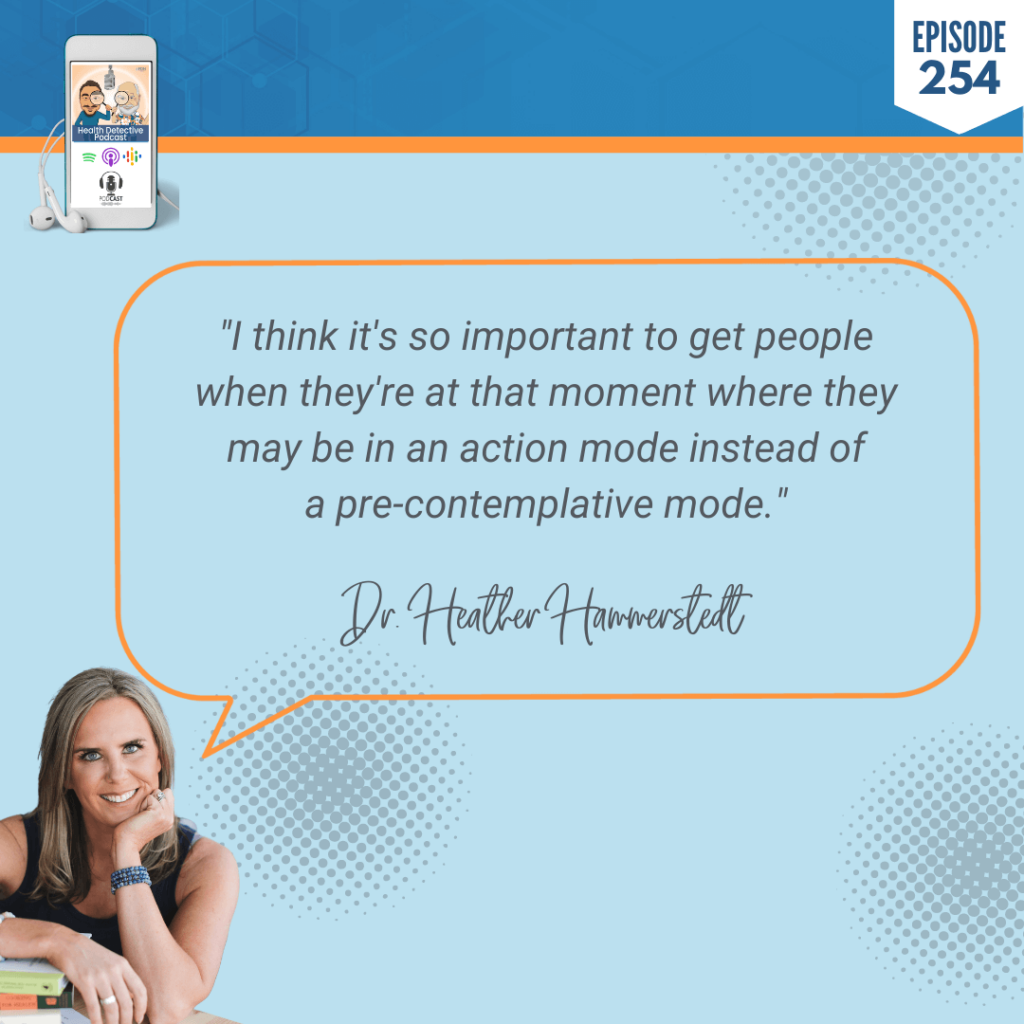
Cause when people come in and are suddenly feeling that event trigger of, I have chest pain and I’m super nervous this is my heart. Thank God it’s not but you have an opportunity to talk to them about prevention. I actually print out prescriptions for exercise and nutrition from the emergency department. Cause I think it’s so important to get people when they’re at that moment where they may be in an action mode instead of a pre-contemplative mode.
[00:06:42] Detective Ev: Gotcha. So, one thing I’m curious about. Maybe you’re just this type of person, because that was a fascinating thing of, hey, you’re just lying in the grass one day, thinking I’m going to be a doctor. But I’m always curious, especially when someone does have this very Western background in a certain sense.
It seems like you were not only open, but extremely interested in the natural side early on. I mean you were literally doing both at the same time. Where did that come from? Was that just a random, intuitive interest, kind of like the doctor thing or did you have a family influence? Cause I have found on here it’s normally one or the other for people and there’s a transitional moment that leads them to it. But it sounds like it was just an interest for you.
An ER MD: Filling in the Holes
[00:07:23] Dr. Heather Hammerstedt: No, I think it was an interest. My parents are very traditional, conventional people. They’re professors, they’re in the sciences.
Honestly, maybe it came from me out of music. I think I was always trended toward music. That kind of opened my mind a little bit more to things that I thought were interesting to learn about. And I started reading about herbal medicine, traditional Chinese medicine when I was still in high school and college. I don’t know, I guess I had a little hippie in me, maybe.
[00:07:52] Detective Ev: It’s interesting and I mean, obviously there’s certain people that are just super smart. With your background, it seems that way. And I feel like intelligent people are just curious. They want to find all this kind of stuff and just learn it.
I have a friend, he’s a brilliant guy. He’s got like 20 different interests that he can speak on very well. You’re like, alright, what? Like, when do you get free time? A lot of his time is spent learning and studying. So, I was just curious. That’s interesting.
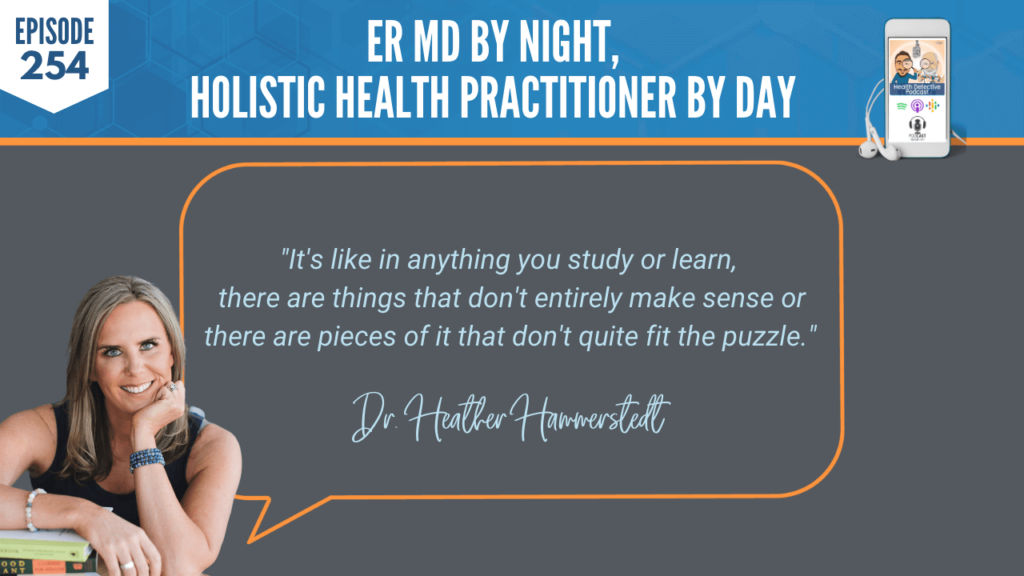
[00:08:13] Dr. Heather Hammerstedt: Well, I think for me it’s like filling in the holes. It’s like in anything you study or learn, there are things that don’t entirely make sense or there are pieces of it that don’t quite fit the puzzle. And for me, I’m always looking. Like, is there something else that someone else has been studying like I’ve been studying this, that I can take pieces of and kind of fill those puzzle pieces?
And like you said at the beginning of this, I wish more people did that kind of way of thinking because of course we don’t know everything, you know.
An ER MD: Subject to the Same Dogma
[00:08:43] Detective Ev: Well, and it’s kind of interesting. What you just said, that sounds reasonable enough to me. I don’t think most people think like that, right?
It was interesting, I had a gynecologist on here, Dr. Kyrin Dunston, who got more into the holistic side and now hires FDNs. So, it’s kind of cool to 360 in a sense. I remember asking her, she’s a little more pessimistic with this, but I asked her, Dr. Dunston, you obviously were very traditional in the medical sense and then became extremely open to this. How would we go convince other doctors that maybe we should integrate all these together?
She was like, Evan, let me tell you something. You’re not going to if they don’t want to believe it. Unless they have some experiences themselves, it might be tough. Again, I don’t know if it’s just that black and white all the time. But it was kind of interesting.
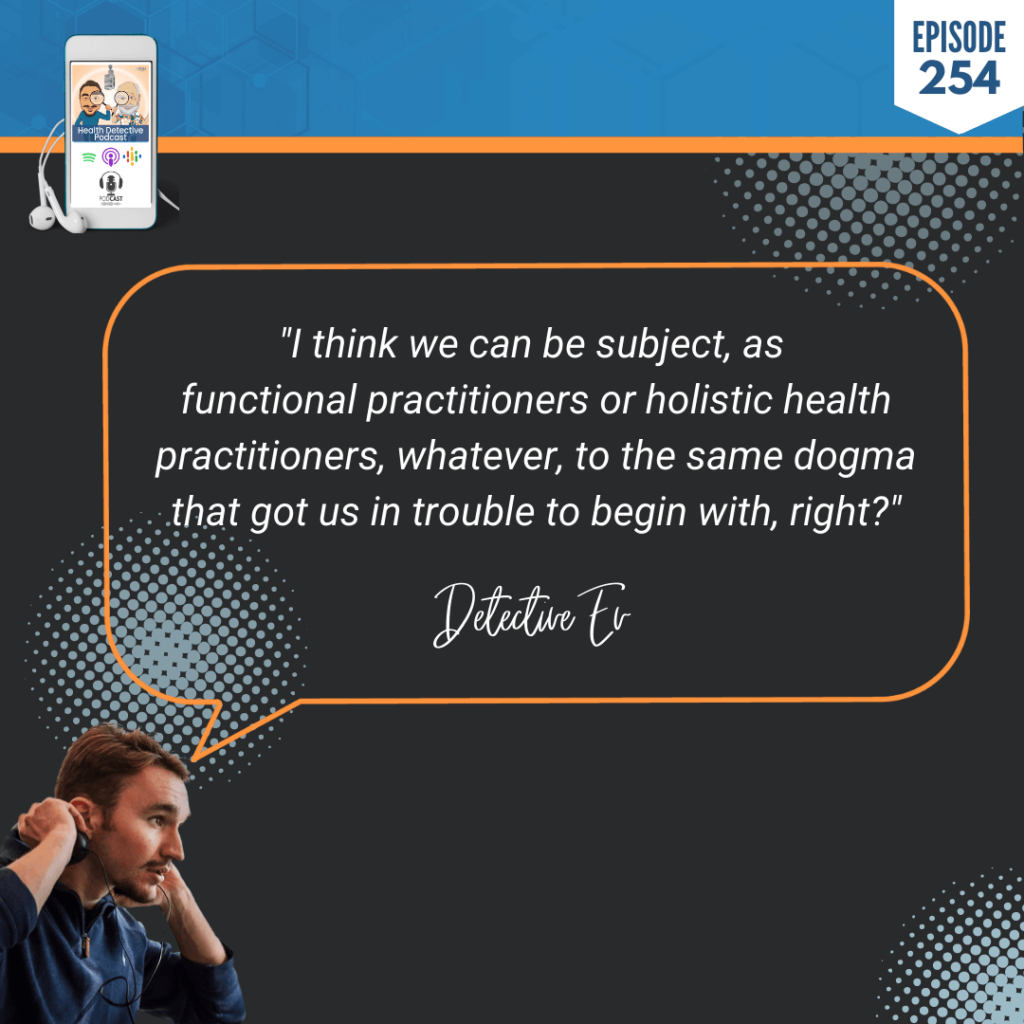
Cause you could even take doctors, generally speaking, very intelligent people, and they might still be kind of, alright, this is the one way how you treat disease, this is what you do. And then again, we see the same thing on the functional side. And I always try to promote the opposite of that. Because I think we can be subject, as functional practitioners or holistic health practitioners, whatever, to the same dogma that got us in trouble to begin with, right?
We went to Western medicine, got upset because they were treating every problem like a nail, and they just had a hammer. Then we get one diet that works for us, now that’s the only diet for every other person, right? Like, that’s the only thing we promote.
An ER MD: It’s Hard to Change People’s Minds
So, it’s funny how we can have experienced the bad side of that and yet we go do the same dang thing. It’s kinda cool that you think so big with this.
[00:10:05] Dr. Heather Hammerstedt: It’s human nature though, right? I mean, she’s not wrong, that gynecologist. She’s not wrong.
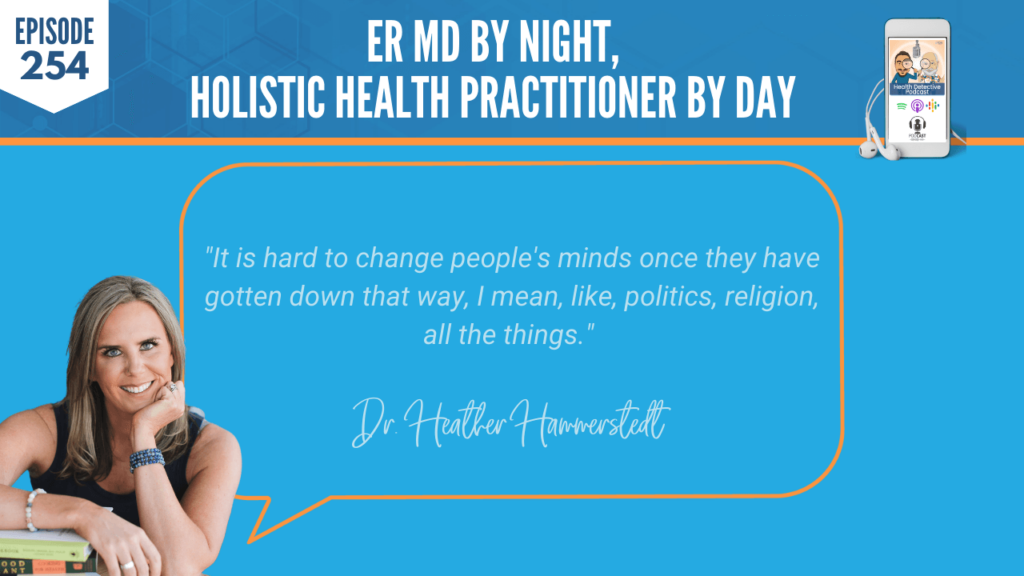
I think if you went into not just healthcare, but into most realms where people feel passionate about, they have their echo chamber and their ideas about what is correct. And it is hard to change people’s minds once they have gotten down that way, I mean, like, politics, religion, all the things. And sometimes I think healthcare can be that controversial for some people.
[00:10:30] Detective Ev: Right. I think it hurts, like mentally it hurts sometimes, right? We want answers, solutions to problems, answers to questions. As humans, I think that’s very natural.
I’ve jumped so many different times, back and forth with politics. I was an atheist then I was an agnostic, born again Christian that got baptized last year. And I actually appreciate that I’ve gone through these jumps because at the very least, you gotta stand for something, otherwise you’ll fall for anything. I love that quote.
But at the same time, it allows me, I hopefully do this, to be respectful to people. I don’t care what religion you are, I don’t really care what political side you’re on. If you’re going to be respectful to me, and I believe that you have the best intentions for people, that’s cool. You have whatever beliefs that you want.
And very few people wake up and have bad intentions for individuals. It’s very few.
An ER MD: Wholist Coaching
[00:11:12] Dr. Heather Hammerstedt: No, I love that. I mean, I think in every change and experience and failure that I’ve had in my life, I’ve only learned more about myself. And it makes me be, like you said, just more accepting and more understanding.
Especially me, as I said, I’m a nocturnists emergency medicine physician. I have lots of people making bad decisions that come to me. And I think it makes me a better doctor of my own kind of steps and forward and backwards to be like, yeah, this could be anyone at any time, you know?
[00:11:40] Detective Ev: Yeah. So, to be clear, right now with the stuff that you do and the coaching that you integrate, do you have a separate business outside of your job as an ER, night shift doctor?
Dr. Heather Hammerstedt: Yeah. Yeah, I do.
Detective Ev: Oh my gosh.
[00:11:51] Dr. Heather Hammerstedt: Okay. So, our company is called Wholist. It’s a playoff of hospitalist, you know, gastroenterologist, gynecologist is talking about the whole person, so Wholist.
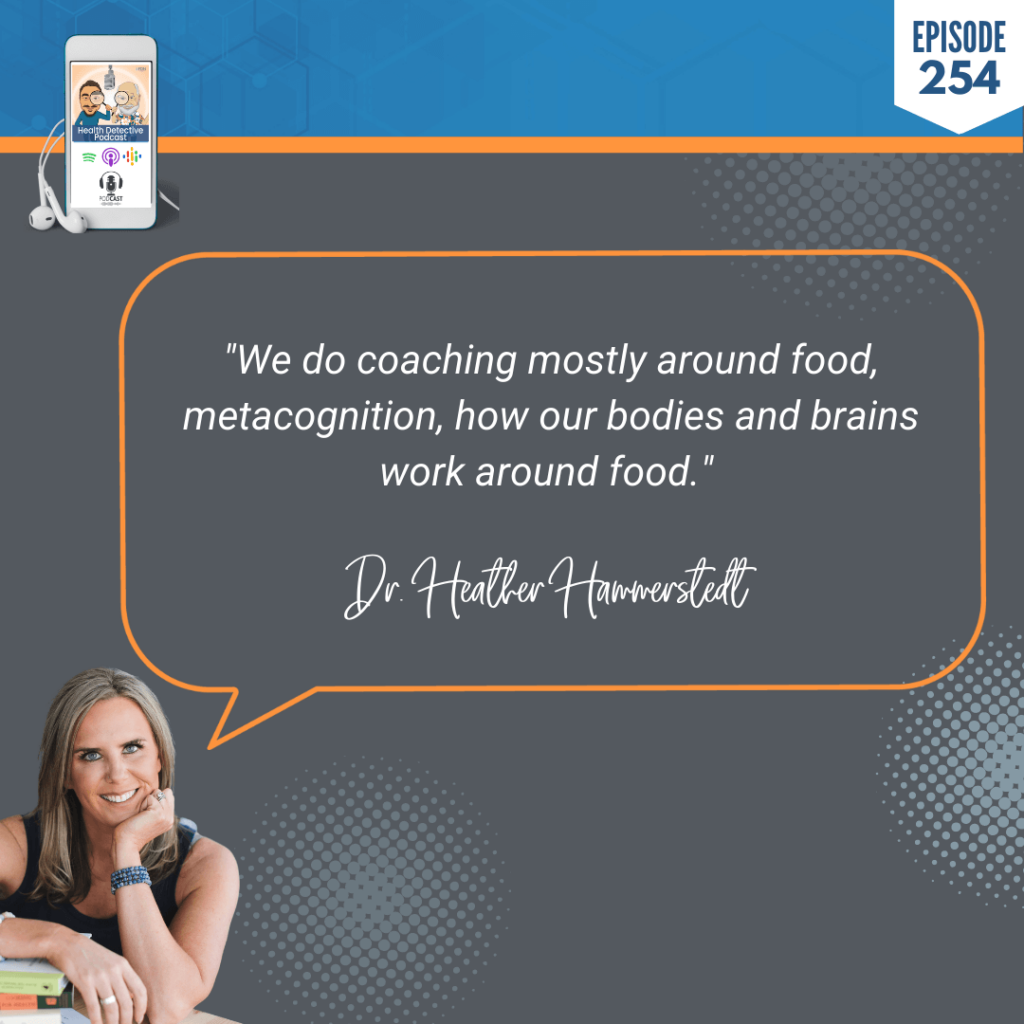
We do coaching mostly around food, metacognition, how our bodies and brains work around food. And also, specifically how we do or do not choose health behavior change and understanding how our brains work neurochemically with that. How to kind of flex meditation and other things like that to understand your brain saboteurs of why you don’t make the changes that you think you should be making.
And so, we run a weight wellness program and a mental fitness program both based on those concepts and it’s really fun. I have a bunch of coaches and sales folks and some assistants. It’s been really rewarding.
An ER MD: A Mix of Work
[00:12:42] Detective Ev: Nice. So, I gotta ask, because we have a lot of entrepreneurs on the show, because they might be practitioners and stuff. What does the day look like? Because if you’re working all night, do you just work the other part of the day and then sleep some? Like how does that work?
[00:12:53] Dr. Heather Hammerstedt: Well, this is the best thing about working. The company that I am a partner of, our emergency medicine company, we get to choose how we pay each other. And when people don’t want to work nights or work weekends, they don’t work holidays, we just pay those shifts more until someone wants to work them.
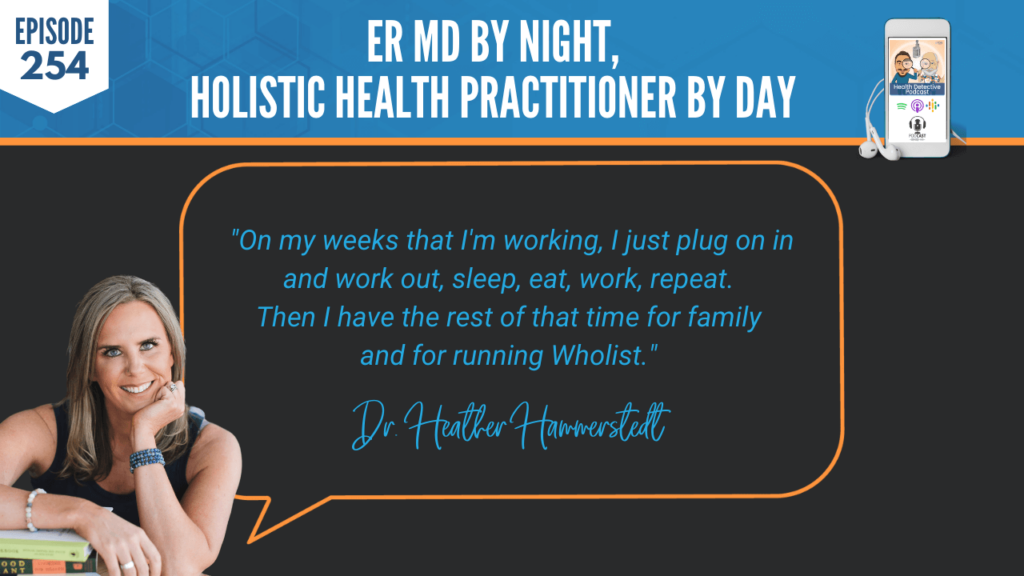
So, I work nights. And then I can work three or four less shifts a month and I choose my own schedule. I usually work five or six on, and then I have eight to fourteen off. On my weeks that I’m working, I just plug on in and work out, sleep, eat, work, repeat. Then I have the rest of that time for family and for running Wholist.
[00:13:31] Detective Ev: I’m glad that you get the time off. Cause I’m like, you are the healthiest looking night shift person I’ve ever seen. I’m like, I gotta know the secret here. How’s she pulling this off?
[00:13:39] Dr. Heather Hammerstedt: I’m five days into a week off. This is prime time.
[00:13:42] Detective Ev: There you go.
Truth be told, I always was a night owl and I kind of liked being up. But man, health wise, I had to adjust it. I would still do it if I could. But okay. That makes a lot more sense, having a mix of both. That’s cool.
An ER MD: Weight Loss & Lifestyle Medicine
So, if I were to come to you guys for weight loss or whatever, thankfully of all the things I’ve dealt with, that’s never been a huge thing for me. But obviously that might be someone who does come to you based on the programs that you have. What would this look like for them? How would it be different from going anywhere else that they could possibly go for weight loss? It’s a huge market.
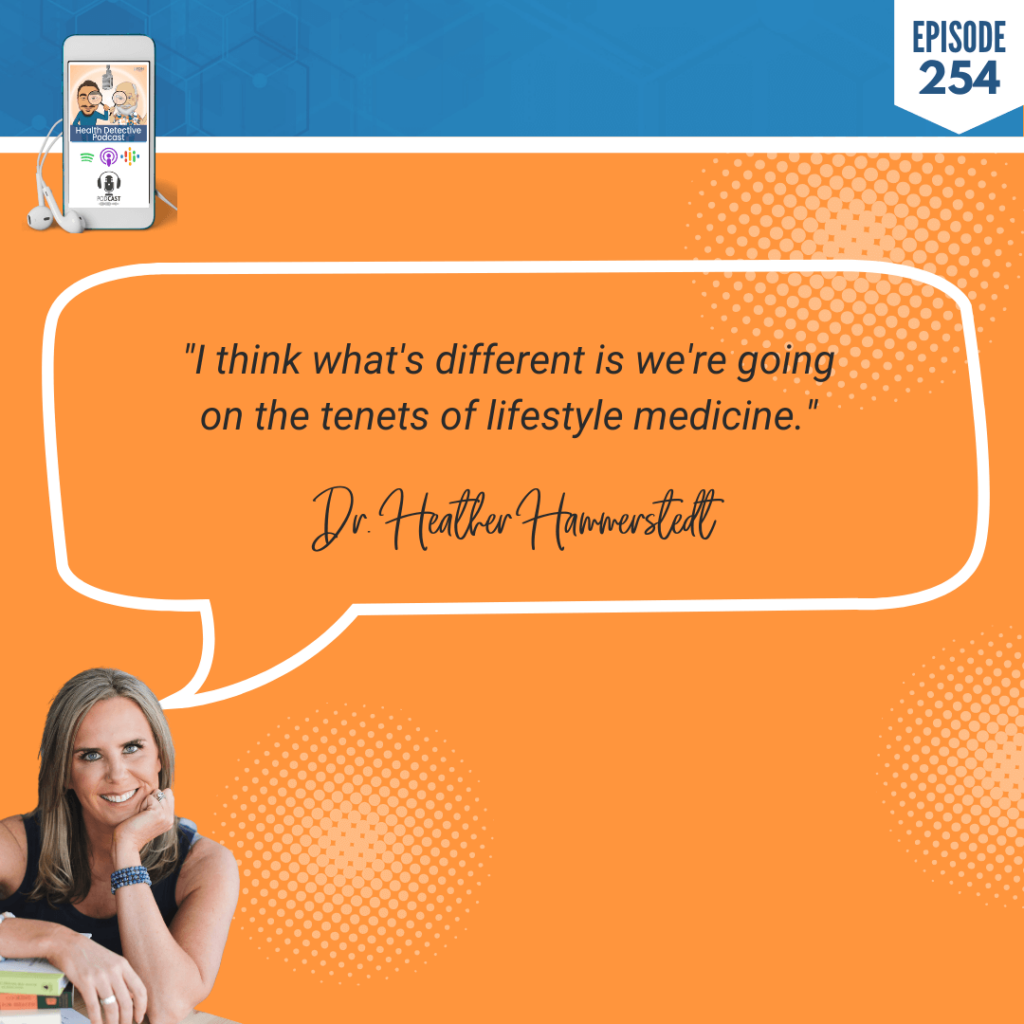
[00:14:14] Dr. Heather Hammerstedt: It is a huge market. And I think what’s different is we’re going on the tenets of lifestyle medicine. We’re really working on what is sustainable in terms of a lifestyle habit for you.
It’s a 12-week program. It is either a personal program where you have a personal food coach and a personal mindset coach, or it’s a group program where you share a food coach with a group of 10 other people. And you get daily podcast information from me about nutrition, macros, metacognition, fasting, and all the things that everyone talks about.
And the coaches really help you implement that based on who you are. So, instead of taking a one pillar program and stuffing it into you regardless of who you are, this is like, let’s learn about how our bodies and brains are really functioning at this point. How do I feel and how am I getting to my goals when I make certain small changes that I can amplify off of? My goal is to help people make that internal change, like figure out the why of why you want to do that.
An ER MD: Metacognition
So, instead of me telling you to restrict and you rebelling, not doing it, it is like, what’s the progress I’m making? What does my plate look like? How is this affecting my relationships, work, or my sleep, all those different things that come into it?
I think it’s unique cause it’s really a physician led program really based on education, science, real food with no gimmicks and no BS. It’s just really, what do we need to do? That’s the weight wellness program.
[00:15:41] Detective Ev: Cool.
You mentioned the word metacognition a few times. For those that might not understand fully what that is, how do you define that?
[00:15:58] Dr. Heather Hammerstedt: I think of it as understanding my thoughts as they are in the moment that I’m in, understanding the thoughts that I have creating my feelings, which are creating my actions. And just being able to trace that process in my own brain and not just reacting to whatever it is that I’m thinking or feeling.
It helps with emotional eating, with cravings, with anger during relationships or work or parenting, those kinds of quick reactions that we have. And being able to sit back and recognize what it is that your brain is doing to you, then thinking, okay, is it because my cortisol is up because I haven’t been sleeping? Is it because my gut microbiome was off and so I’ve made no serotonins, my feel-good hormones are off, right? Or like, am I filling a dopamine hole with food? When in fact, what it is, I’m upset about the conversation I just had.
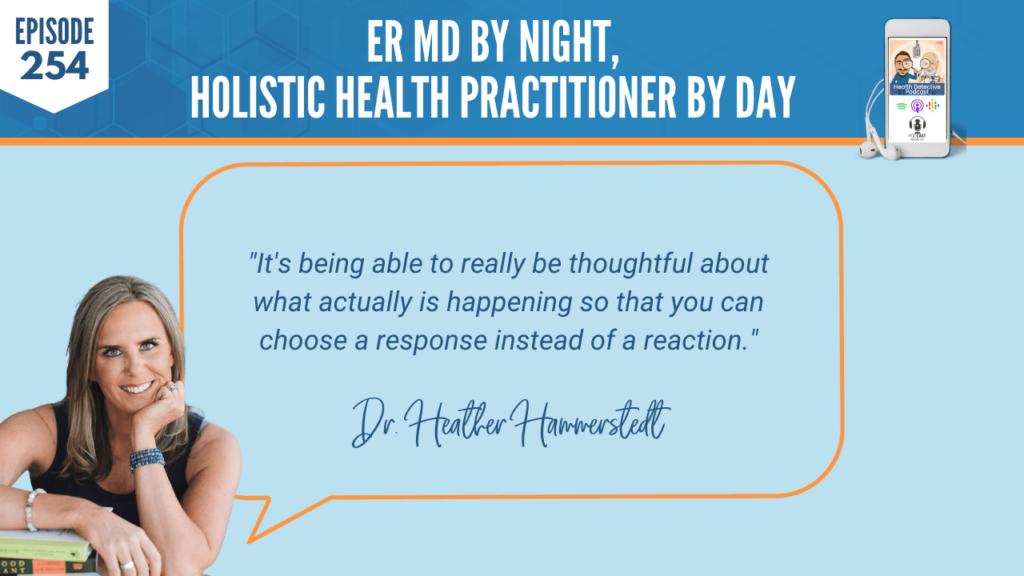
It’s being able to really be thoughtful about what actually is happening so that you can choose a response instead of a reaction.
An ER MD: Learning to Choose a Response
[00:16:47] Detective Ev: Okay. That almost sounds similar to that whole cognitive behavioral therapy triangle.
It’s so funny to me when people say this, it doesn’t sound that complex. But really, unless you’ve tried to engage with this, and I’m sure I don’t do this perfectly myself.
Dr. Heather Hammerstedt: Nobody does.
Detective Ev: Most of us don’t do this. We run very reactionary. Things happen to us and then we respond. We don’t ever really think about how we’re going about our daily lives.
I always kind of say that, and this makes a lot of sense for what you’re doing, the health journey and actually getting well, like if you’re really trying to deal with the chronic disease stuff, cause we’ve had some people come on here with wild stories, it’s as much if not more of a personal development journey as it is a health journey.

You could give someone all the lab results and all the greatest information in probably a matter of a few hours. They might not fully understand it, but I could give them the data and the protocols. Ninety-nine percent of people will still be sick months later after getting that if they’re not continuously worked with and supported in some way. Because again, we’ve got to change something up here, not just what we’re putting in our mouth or the other things. Because if we fix this, a lot of the other stuff can happen easier.
That’s cool that that’s a component. Some of us go through our entire lives, I think, without the privilege of realizing that we can control a lot of our reactions to things.
[00:17:56] Dr. Heather Hammerstedt: Yeah. It’s not just around food, right?
An ER MD: Internal Conscious Processing
This is a really old book, I think it was from 1972, Herbert Benson. He was a Harvard psychiatrist who wrote a book called The Relaxation Response. I actually did my residency in Harvard, and I had the opportunity to work with him doing a side study with him in our emergency department. It didn’t end up working, but he was nice enough to humor me. It was like doing meditation for procedures.
But it’s a fantastic book. Of course, it’s really old. But what I got out of that and have internalized for myself is that there is a very different thing between a stress reaction and a stress response. There’s an activating event, right? Maybe it’s an external event that happens to you, or maybe it’s a thought that is doing something to you. And a stress reaction is like an internal alarm activation. You kind of start overstimulating your sympathetic nervous system, like running from the T. Rex problem, running from the bear.
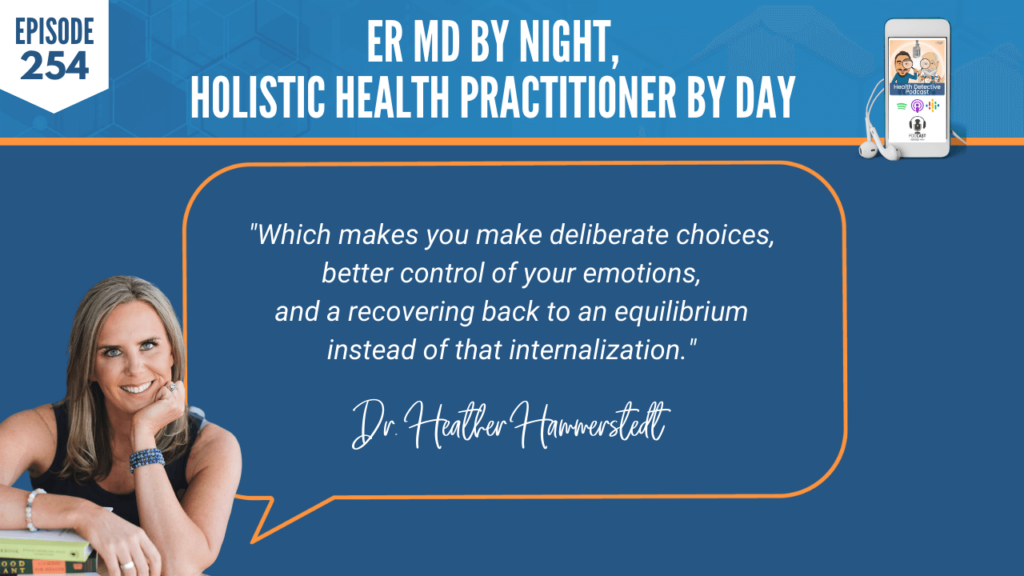
You internalize the situation and then there is some sort of maladaptive coping or a breakdown of emotions, but you don’t actually deal with the event. Whereas like the stress response, you have that external event. And then if you’re able to analyze your own thinking around that, you have some sort of internal conscious processing that can cause mindfulness of the situation, a recognition of the chain of events, and what influence that’s going to have on you. Which makes you make deliberate choices, better control of your emotions, and a recovering back to an equilibrium instead of that internalization.
An ER MD: Re-Empowering People
Obviously, I’m an emergency physician. There’s like an external event every five minutes. And I’m a parent of two small boys so there is an external event. I’m an entrepreneur, there is an external event, right?
Detective Ev: Constantly. Yeah.
Dr. Heather Hammerstedt: So, figuring out how to recognize that has been, for me, really personally important and I think really important to anyone’s health journey, whether it’s around food, wanting to lose weight, around who am I and how am I responding to the world, you know?
[00:20:00] Detective Ev: Yeah. And we can see this because there’s times throughout history and even currently where, you could take the pandemic, many people are going through kind of the same thing. Yet there’s these dramatically different responses. Although it kind of sucked dealing with a lot of the health stuff that I had because there was a lot of physical things, but there’s also some severe mental health stuff.
I’m so thankful that I had to work on those things before this craziness happened in the last three years. Because I already felt off when it first began, right? It was tough to get out of in a sense, but I had the tools, and I had the awareness now. I’m thinking like, man, if I was eight years back, I just would’ve been going in a downward spiral. And you don’t know why in the moment if you don’t have this awareness yet, or these techniques. You have no idea why you feel this way, it’s so disconnected from the event itself and you feel hopeless. That’s really the thing.

So, this is re-empowering people to be able to take control over their lives and make the best out of the situations that they might be dealt with.
An ER MD: Being Gentle with Yourself
[00:20:55] Dr. Heather Hammerstedt: Yeah. I think we all need to give ourselves grace.
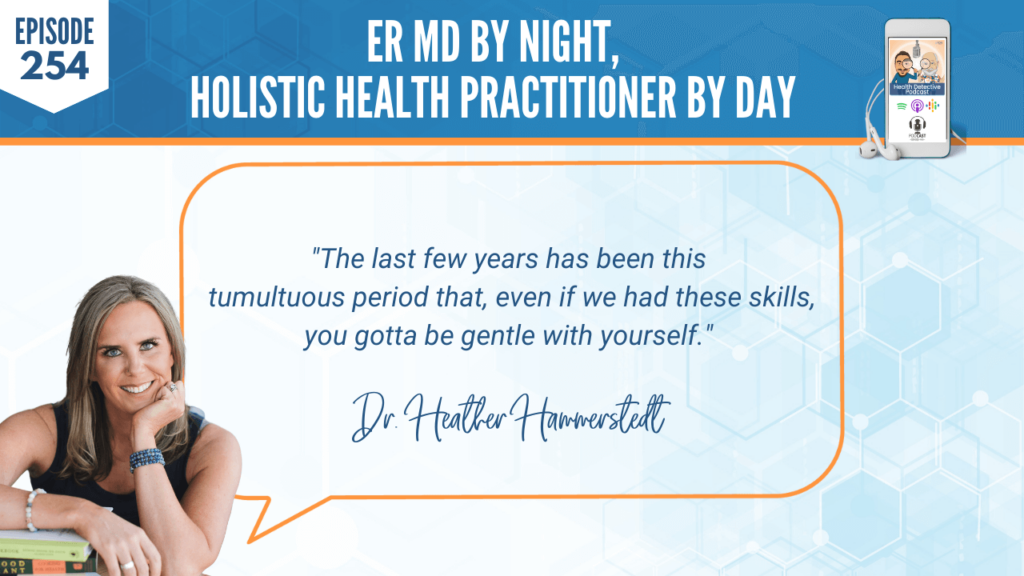
The last few years has been this tumultuous period that, even if we had these skills, you gotta be gentle with yourself. Using them was not always easy as well. You’re right in that.
[00:21:10] Detective Ev: Okay. With your particular program then we talked about how that might look and work. From my understanding, from remembering the bio correctly, you’ve been doing coaching for 19 years, right?
[00:21:22] Dr. Heather Hammerstedt: Yeah, I took a little hiatus at the beginning of my emergency medicine career. But yes, 2003 when I was a third-year med student is when I got my coaching certificate.
[00:21:32] Detective Ev: Okay. So, then great question for you. We have a lot of people that are just starting their coaching journeys. And FDNs, by definition they might be a coach in a sense, but our program by itself is more the labs science, which has its own importance. We’re not teaching the coaching skills as much; we do have some advanced courses for that.
We have many people, including myself, that actually have come from Institute for Integrative Nutrition and then transitioned into FDN. I did it. It was fully online by then, that was 2016, I think. It is good to have both sets of skills.
My question is, as someone who has been doing this before it was trendy and cool, what is like one great tip? I’m sure we could do a whole podcast on this, but if you could give a tip to a starting out coach for them to effectively work with their clients and help them help their clients through the hurdles that they might deal with, what’s one tip you might give them?
An ER MD: A Business Tip
[00:22:26] Dr. Heather Hammerstedt: I think that the people you want to work with have to be you. I mean, I have been most successful creating a program that I knew I could use myself, being in a crazy schedule and having enough time to like get it in and speaking to that mid-career professional woman going through the same struggles that I have. And I think that if you’re inauthentically trying to coach people who you have not had their same problem, they’re going to feel that.

So, I think finding that group of people, finding that niche, finding what really sets you on fire and speaking to that, people are going to gravitate to you more than if it’s something that feels like you’re not. I always feel like I should feel like I’m not working when I’m talking about stuff like this, you know? Cause I love it so much.
[00:23:17] Detective Ev: Sure. Well, it’s actually a great business tip too, right? We actually talk about business a lot on the podcast. People say, well, how do I start out my business? How do I, they use this word, “compete” with other people out there? And I’m like, well, you have to understand that your unique experience and story is valid, not only from the business side, but from the coaching side.
I might be someone that doesn’t have a doctorate, I might be someone that doesn’t even have a college degree relevant to this stuff. However, having gone through the things that I’ve gone through, I’m going to understand unique pain points and struggles that someone else might not be able to.
An ER MD: Reaching as Many as Possible in a Coaching Realm
I know people with severe cystic acne, cause that was one of the things I had as well, people with severe cystic acne check the mirror a thousand times a day. They’re embarrassed to get in family photos and feel like they’re not worthy of dating. Those might overlap with other conditions, but that’s not every condition. That’s unique to a certain type of person.
And I never thought about it like that, but obviously yeah, from the coaching side, you can just support them at a higher level if you get them on that deep level. And interestingly, some of the better outcomes might just be because they trust you more since they know that you are actually part of the journey as well.
[00:24:18] Dr. Heather Hammerstedt: You can hold space open for someone that they didn’t know they needed if you have walked in their shoes in a way that someone else can’t do.
[00:24:27] Detective Ev: Now you talked to Reed before, you know how big we are on the labs. It’s not the only thing, it’s just a tool that we use. I’m curious, in your programs outside of the ER stuff, obviously they’re going to do blood testing there and things, but outside of the ER stuff, are you using lab testing in your business or is it mostly around the coaching?
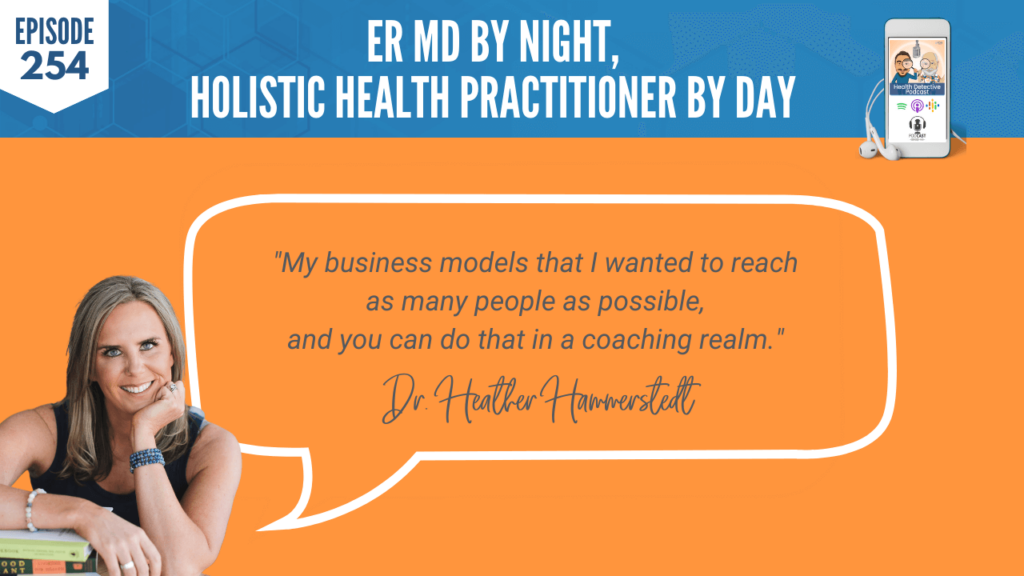
[00:24:43] Dr. Heather Hammerstedt: Yeah, it’s all coaching. My business models that I wanted to reach as many people as possible, and you can do that in a coaching realm. I’ve used the tenants of lifestyle medicine to create a coaching program that we can implement. But we’re not practicing medicine, so we’re not doing labs or interpreting labs. And we’re trying to work with people’s primary care as best as possible.
An ER MD: Partnering
In fact, one of the newer things we’re doing in 2023 is partnering with physician clinics, with obesity medicine, lifestyle medicine, direct primary care, and med spas, to do coaching for their patients so that they can do all the medicine and communicate with us.

We do the coaching aspect and sort of outsource that for them, so they don’t have to pay those labor costs and work together. I think it’s a pretty good model moving forward because we can’t all do all the things.
[00:25:30] Detective Ev: Right. That is true. It’s not that I’m trying to be lazy because there are FDNs that do add the coaching side to their practice, but to me, I’d rather kind of just be good at the one thing.
It’s actually nice knowing that you have this, because there’s plenty of people where, when I’m on an onboarding call, I can tell that they need so much more on the coaching side than they do on the lab side. I’m like, all right, this is not going to work. I promise you, you gotta go address that first and then if anything’s left over, cause you’d be surprised what can heal when you do get the mindset stuff right, then we can work on the labs.
But the labs and these other things kind of become useless if the person needs that high level coaching and you’re not offering that to them.
[00:26:04] Dr. Heather Hammerstedt: Right. Well, I mean, vice versa too though. Having some data coming from labs can be very helpful in terms of helping people navigate what is the first thing that they need to approach.
An ER MD: Welcoming Collaborations
I really liked talking to Reed when he was on my podcast about that portion of it. And I did kind of needle him a little bit. Because I’m a biochemist from trade so, I’m like, what’s the pretest probability of ordering a test and what are you going to do with it? You know? And so, we had a good back and forth about that.
[00:26:35] Detective Ev: Nice. Well, that was actually kind of my next question. If you obviously see the validity in the lab side, are you always recommending that people work with someone else too? Or would you just recommend that they work with you guys exclusively? What are the limitations if you believe that there is validity to the lab testing side for these clients and maybe even some other therapies?
[00:26:55] Dr. Heather Hammerstedt: I think people should have as many helpers as they need. Some people come and just need us to educate them, give them the roadmap to how it works for them to be healthy, fit, strong, and meet the goals they want to be, whether it’s like chasing grandkids or climbing Bora Peak, right?
Detective Ev: Yes.
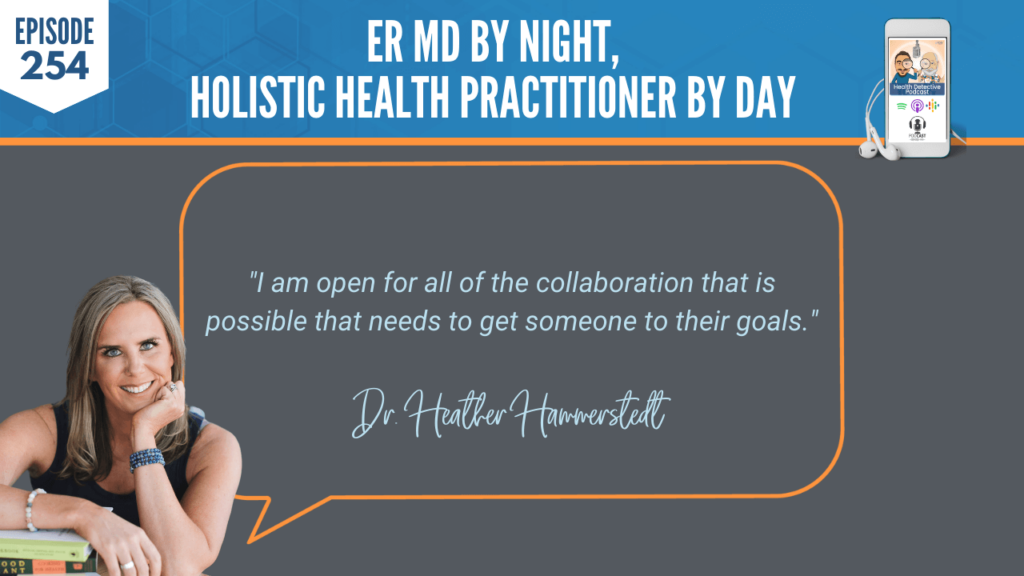
Dr. Heather Hammerstedt: But there are people who are like, if your primary care doctor is open to talking to us, we would really like to talk to them and form that relationship and work with them. If someone wanted to work with a functional person as well, that’s totally fine. I am open for all of the collaboration that is possible that needs to get someone to their goals.
[00:27:34] Detective Ev: Sure.
An ER MD: The Hole in Between
Resetting a little bit. There was something in your bio along the lines of having some kind of moment where you talked about like BS almost, you know? You’re pretty blunt. There was kick a** and BS in the bio, I loved it. But some of the BS with the Western side.
Now, what’s cool about you is you’re obviously still deeply involved in both, so you see that there’s great in both. But when you say BS, what were you referring to specifically? What’s the BS going on?
[00:28:00] Dr. Heather Hammerstedt: I don’t remember what my bio said, but what I can say, I’m very proud to be an allopathic physician. I think we do really well in a lot of ways. That’s one of the reasons why I’m an emergency physician. Because if someone needs me to put in a chest tube or do CPR or intubate, we do a really good job at all of those very procedurally based lifesaving things.
And I think we have the potential to do really well in the primary care fields as well, but they are so overwhelmed and overworked outside of their own ability to control, right? A lot of it is insurer based and administrator based, and they’re just running a hamster wheel doing the best they possibly can.

I think because of that, that is why people who have more complex issues feel unheard and can get lost. They can’t get into the primary care, or they only had 10 minutes, or whatever it was. Then they come to me as the other option that’s open. And I’m like, great news, you’re not dying! You know what I mean? So, in between there I think is where we’re missing a lot.
An ER MD: So Right, Then So Wrong
And I think that there are businesses out there that are going to solve this problem, health advocacy companies that are helping people navigate in between all the different specialties and the different things that they want to do and kind of bringing them to harmony. But I do think that that is a big thing that we’re missing.
[00:29:26] Detective Ev: I’d love to know what you think about this, cause this is just a loose kind of theory that I have. Because again, I don’t want enemies between Western and natural, I want it to work complimentary. I think that’d be an amazing thing.
One of my things that I always go back and try to ponder is how did we end up being so amazing with the Western medicine side for certain things? Like if I break my arm, it’s incredible that we can do that. If I have, gosh forbid, a heart attack, it’s incredible that we can go take care of that for some people. How then did we screw up so badly on a lot of the autoimmune stuff and all these different things?
My thing always is it looks like Western medicine was created in demand to our crazy world. You know, there were infant mortality rates super high. We were breaking our bones and we kind of created stuff for that. But it seems like we’re still using that paradigm for these new age, lifestyle based diseases and it’s just not the right paradigm for it.
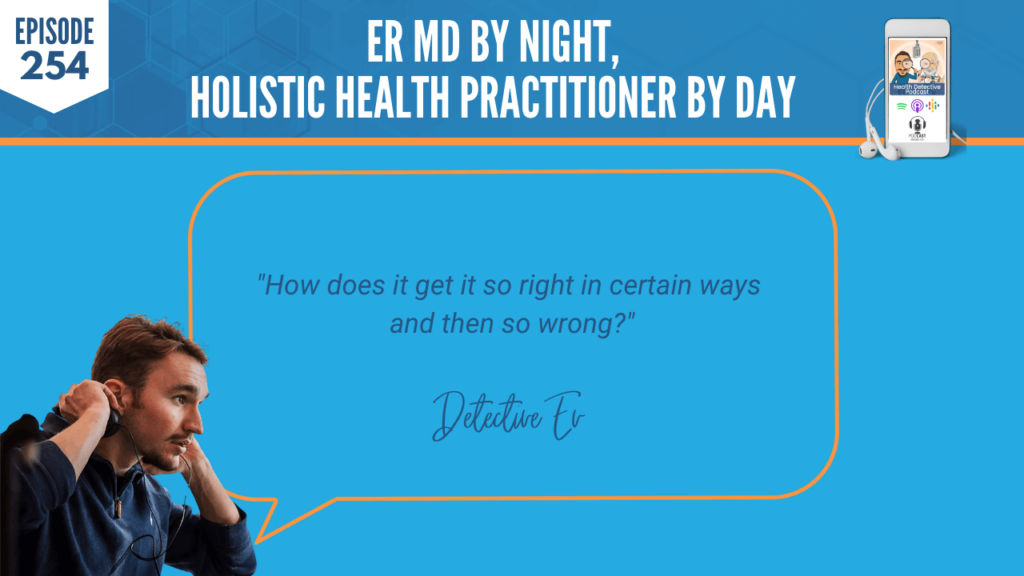
That’s my loose theory. But how does it get it so right in certain ways and then so wrong? Am I correct with that or is it just, are they overworked? Is that really the main problem? I’m curious.
An ER MD: Science Evolves
[00:30:28] Dr. Heather Hammerstedt: Yeah, I know. I mean, I don’t think you’re wrong.
I think that science evolves. Like, were we really good at fixing heart attacks 30 years ago based on doing cardiac catheterization and putting drug-eluting stents in that we do now? I can get someone to the cath lab 20 minutes after they come in with their widow-maker heart attack and save their life. We couldn’t do that 20 years ago.
And I think autoimmune diseases are a great example. Like from a personal perspective, my mom’s been hospitalized four times the last six weeks. She’s still there in Pennsylvania. And I think there’s an underlying autoimmune problem that’s causing all of the other things that she has, but no one’s been able to put their finger on it.

We have six different specialists seeing her and trying to find someone to meld it all together. It’s complicated cause we don’t really understand the autoimmune system nearly as well as we will in 15 years. I mean, think of everything we’ve learned about the gut microbiome in just the last five years, it is astounding. I could be here for an hour just talking about that. And so, I think that that’s coming.
Anyway, I don’t know if that exactly answered your question, but that’s my initial thoughts.
[00:31:35] Detective Ev: No, it does. And I mean, I have something to add to it cause that makes sense. It’s like, okay, well obviously we weren’t seeing the same level of autoimmune type stuff. At the very least it wasn’t getting diagnosed. I also don’t think it existed in the amount that it does today, 200 years ago.
An ER MD: Following the Money
So, it’s like, all right, well we have to create stuff for the immediate problems. And again, you had things like, something I referenced on the show a lot, is like early 1800s in America, you had a 50% child mortality rate by age four. Which is the saddest thing in the world and crazy. So, yeah, we have to address that problem first. And so maybe we start putting more research dollars into things like that.
Right now, there is a lot of research being done in the autoimmune space and all these things. I just think our modern lifestyle has shifted so greatly, so fast and created so many new problems for people that it’s like, holy crap. It’s hard to keep up sometimes for Western medicine.
But it’s still a different paradigm because Western medicine, especially like the pharmaceutical companies, they’re going to still look for a treatment or something similar to an autoimmune condition. Whereas like an FDN practitioner, we’re not treating or diagnosing anything specifically. But we’re utilizing the labs and the natural protocols to hopefully allow the body to get back to where it’s supposed to be. So, it’s still a fundamentally different paradigm, I think.
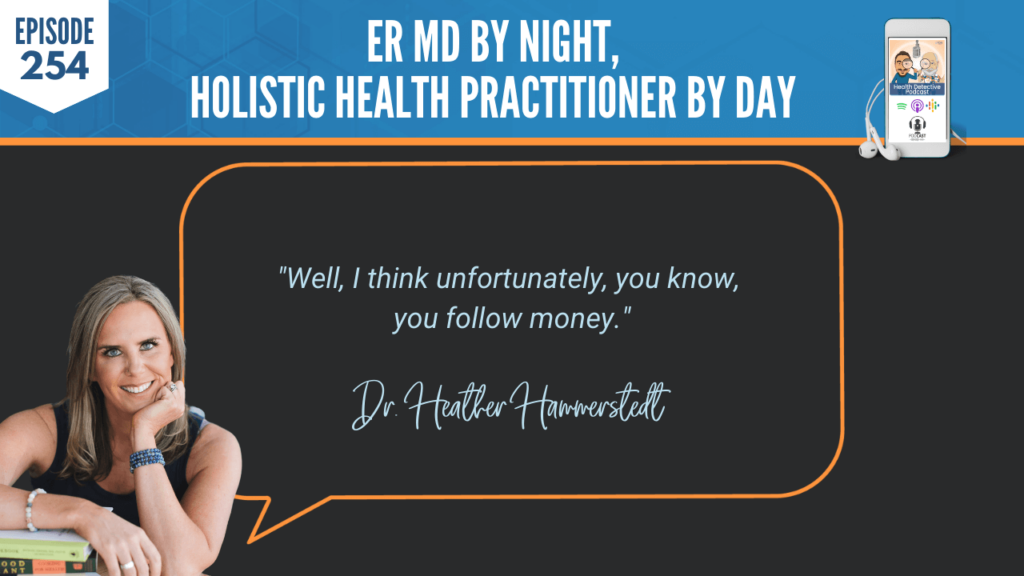
[00:32:45] Dr. Heather Hammerstedt: Yeah. Well, I think unfortunately, you know, you follow money. I mean, think about how fast the pharmaceutical companies and the medical device companies worked at the beginning of the pandemic to come up with what they did. Regardless of how you feel about Covid, vaccines and testing came very fast when usually it’s a 20-year process to come up with something new. And that’s because there was attention and there was money on it, right?
An ER MD: The Art of the Application of Science
Like how much attention and how much money is on lifestyle diseases and autoimmune problems? There’s just not, to be honest. It’s not sexy and it doesn’t make them a lot of money. That, unfortunately, is where the research comes from and somehow that’s how we’re a little bit stuck.
I did want to give you another example of how I’ve seen medicine change pretty rapidly and kind of gives you that perspective of things moving. So, sepsis is like an overwhelming bacterial infection of your blood. It can cause organ problems, can cause shock, can cause death, can come from any bacterial organization.
When I was finishing residency 18 years ago, we had all these very clear protocols of what we thought a hundred percent needed to be done for this. There were central lines put in and certain vasopressors, certain things that we were doing every single time to all these people.
And now here we are 18 years later and we’re like, yeah, that doesn’t work.
Detective Ev: Sorry.
Dr. Heather Hammerstedt: Yeah. I mean, is it a bad thing? No, we helped a lot of people, we learned a lot of things. Did it hurt people? I don’t really think so. But now we’re realizing that it didn’t really do the things the studies that we had at the time, that we thought were validated and successful, it has not turned out to be the case.

Now we shift to a different direction. So, I do think that when we’re thinking about medicine, as in all rest of healthcare, it is science. But it is also the art of the application of the science based on what we understand as humans and as a health community and as a scientific community.
An ER MD: The Base of a Lot of This
I have hope that there are things we don’t understand, chronic pain, fibromyalgia, autoimmune problems, these things that, right now, a lot of Western medicine is like, I just don’t know, that we’re going to understand and be able to come up with a unifying underlying cause and treat that.
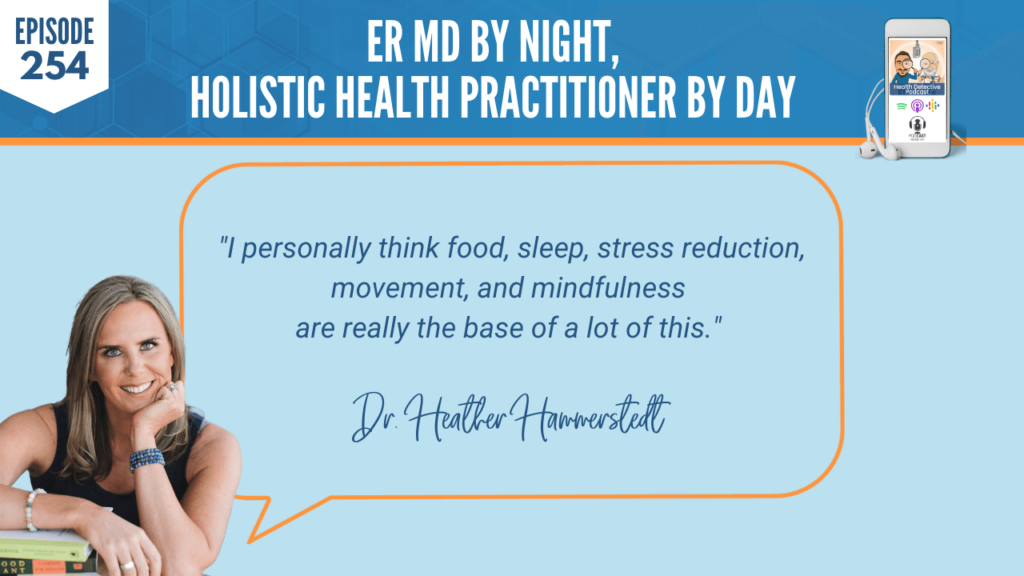
I personally think food, sleep, stress reduction, movement, and mindfulness are really the base of a lot of this.
[00:35:03] Detective Ev: Yeah. That would be great if we could just get people on track with that.
Dr. Heather Hammerstedt: Yeah.
Detective Ev: You mentioned off air and in the beginning so genuinely, I could tell this desire to be open to all perspectives and things. So, I hope I can ask you this question because I really mean it in an open way. I’m the same way, I try to be, at least. I want to be on both sides and think from both perspectives or however many there might be on a given topic.
But you mentioned this thing about science and implied how there’s this evolving aspect to it, it constantly changes. And one of the fascinating things you saw in the last three years as well, I mean, again, I’m not picking on one side. If anything, full transparency, I would probably lean towards more of that side, although I don’t know, after these three years.
But there was a push to follow science as if it was God. It was this overarching truth, a hundred percent right, and you are idiotic not to follow it. But it sounds like you also recognize that there’s this side that can evolve and sometimes we’re wrong with it, but it might be the best that we have. So, that’s why I go back and forth with it.
An ER MD: Viewing Science in a Proper Manner
Not from a political side, just a medical side, what did you think from that narrative of follow the science, follow the experts, don’t question this, do what you gotta do?
Dr. Heather Hammerstedt: Are you talking about Covid?
Detective Ev: Just talking about Covid over the last three years. Yeah, it’s dragged on now, but it started I think with Covid. I started hearing that much more.
[00:36:21] Dr. Heather Hammerstedt: Yeah. Well, science starts as a hypothesis, right? I mean, that’s how you run an experiment, is you come up with a hypothesis and you try to disprove it. And then if you don’t disprove it, then it’s proved until you come up with a new hypothesis and try it again. And so, that’s how I view science.
I mean, you also are talking to someone who was in a papper intubating people who were dying from Delta in 2020, every day.
[00:36:48] Detective Ev: That’s why your perspective, I think, is very valid.
[00:36:49] Dr. Heather Hammerstedt: So, yes, I was on NBC nightly news talking about please stay home and please wear masks and you know, please be respectful. I did a lot of that in mid-2020 and I stand by that. As with all of it though, Covid evolved, our understanding of it evolved, and here we are now.

Honestly, the strains that we have now are nowhere near as dangerous. And so, the way that I feel is very different than when I thought I was going to die. You know what I mean? Like trying to take care of people. So, I don’t know if that answered your question. But I do think that all of us need to think about science as an evolving process.
An ER MD: To Stay at Home or Not Stay at Home?
[00:37:31] Detective Ev: It does answer my question, and this is why I like organic conversations cause you never know where it’s going to go. I don’t want it to become a Covid thing, but I appreciate anyone that is a curve ball person.
I don’t know, and I won’t ask on air that’s not appropriate, but I have no idea which side, if you will, you would lean on. And I like that about you. Because it creates, I think, healthier thought for people. That’s, again, what I strive to be. I’m probably not perfect at it. In fact, I know I’m not.
Dr. Heather Hammerstedt: None of us are.
Detective Ev: I like to talk to people like you cause it helps me. So, I’m curious about this, if I can ask one follow-up question then. Cause I’ve never gotten a good answer to this, but you might be the person.
So, you talked about, you were on the nightly news, even talking about staying home. Totally get that because there’s many deaths that occurred from this. What’s fascinating to me is, and you actually might know this faster than me, do you know how many people died in the USA from Covid offhand, roughly speaking?
Dr. Heather Hammerstedt: I don’t.
Detective Ev: Over a million for sure.
Dr. Heather Hammerstedt: Yeah, for sure.
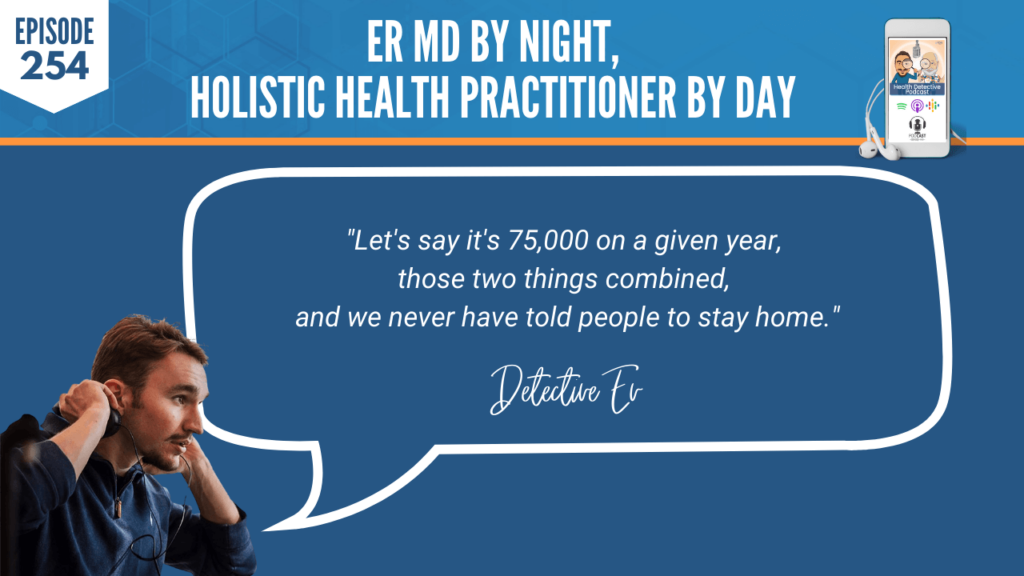
Detective Ev: Because you’ve been a doctor for a while, let’s take a bad year of influenza. You got about 60,000 people dying with pneumonia, might be, you know, 20, 30,000 from my understanding. So, let’s add that up. I don’t want to over exaggerate it, that might be 90,000. Let’s say it’s 75,000 on a given year, those two things combined, and we never have told people to stay home.
An ER MD: Untrained in Treatment Care
Now over a million is a heck of a lot more than 75,000. At what number of deaths do we tell people to stay home for a virus?
[00:38:51] Dr. Heather Hammerstedt: Oh, that’s really interesting. I didn’t think that’s where you were going.
I don’t think it’s a number of deaths because when we were very clear, which was the first month or so of the pandemic, it was because we did not know how to treat or what was coming. So, for me, it’s less of how many people are going to die and more like, I literally do not know what to do for you.
Like if you came in, I would be like, I don’t know. I’m going to support you in all the kind of supportive ways possible. I’ll intubate you and put you on the machines and give you blood pressure medicines and all those things. But like with pneumonia and flu, we know what to do. And now with Covid we know what to do.

So, it’s less the number for me than it is, can I actually take care of you, know what to do, and have room for you in the hospital? That was the biggest issue. It was like, I literally might not have room for you. That happened in a lot of places, thankfully, did not happen here in Boise.
[00:39:43] Detective Ev: Well, and it might surprise a lot of people, but I took the same exact approach in the beginning of the pandemic. Thankfully, I took photos of this cause people wouldn’t believe me. I have photos of me with an N95 in February of 2020 cause I was so paranoid about this. Remember we didn’t know what it was at the time.
An ER MD: Looking for Understanding
I thought it was the superbugs I read about. It’s going to be antibiotic resistant; it’s going to kill everyone. Put on the dang mask, like I’m freaking out. Of course, you get more data and then you do it differently. The reason I asked the question is because, again, I was someone who was in that boat, to be fair.
But I’m always fascinated even with the mask thing because there are still some people to this day that would talk about pushing them at a holiday, whatever, because you could kill grandma. I’m like, okay, that is true. And I’m more likely to kill grandma with Covid being spread than I am with the flu or pneumonia from my understanding. But grandmoms still die every single year from the flu and pneumonia, and you weren’t a bad person for not wearing a mask.
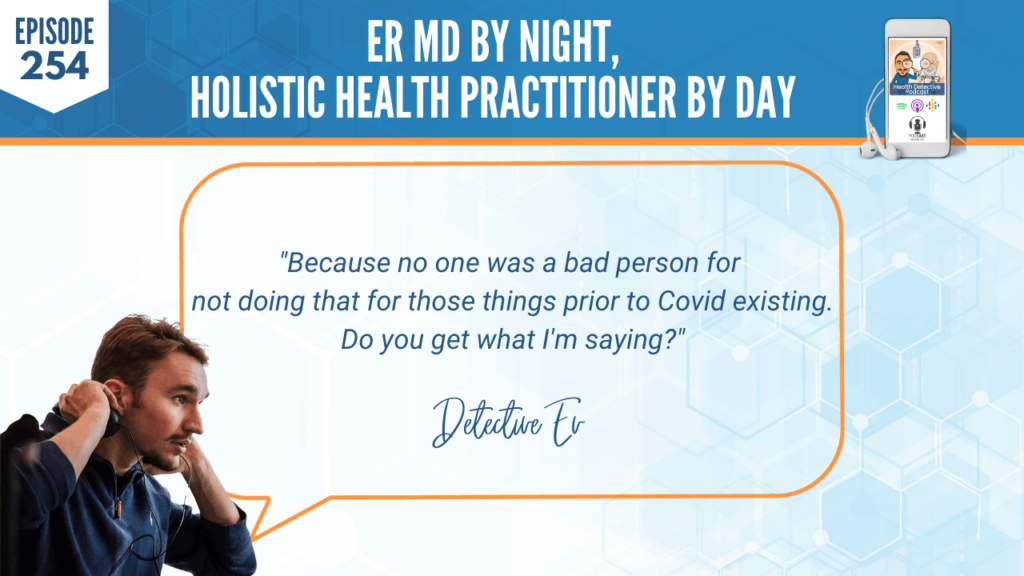
So, I guess a better way to word the question is like, all right, well, Covid kills a lot more people though. But you weren’t telling me that at 75,000 people dying from pneumonia and the flu combined, so at what number between 75,000 and whatever Covid is, do we start saying, you’re a bad person for not doing that? Because no one was a bad person for not doing that for those things prior to Covid existing. Do you get what I’m saying?
[00:40:53] Dr. Heather Hammerstedt: I do. There was definitely not a stay-at-home like there was in March and April of 2020. But we were asking people to vaccinate against the flu and against pneumonia, so we didn’t hurt grandma and hurt little kids. And so that, I think, has the same kind of relevance to it.
An ER MD: Losing Weight Sustainably
[00:41:08] Detective Ev: Very interesting. Thanks. It gives me something to think about. I’ve asked that question to a few different people on a variety of different sides. But I just like anyone who’s open-minded, it helps me think. I’m always trying to develop my thoughts with every area.
The funny part is people think when they listen a lot, that I have certain opinions on things. They don’t realize I’m just arguing the opposite. Sometimes the opinions that I give on the show are actually the exact opposite of what I think, but I’m trying to get a good counter. So, a little secret for anyone who listens regularly.
With that said, you have a specific approach that you’ve learned and developed over 19 years, basically, of the coaching thing. Before we wrap up our time here and then re-shout out where people can find you guys if they’d like to work with you cause I’m assuming they can do so remotely, for someone who’s done this stuff for so long, I’m sure there’s like some interesting testimonials or cool stories.
So, to the degree that you’re able to share for privacy’s sake, I’m wondering are there any really interesting stories that come to mind of someone who maybe came to you, and they were really struggling before, they tried a bunch of things, and then they got better using your program?

[00:42:10] Dr. Heather Hammerstedt: Yeah. On average, people who come to us for a weight wellness program will lose about 10% of their weight in the 12 weeks. And the vast majority of them have done that sustainably. So, that’s the number.
An ER MD: The Most Fun Wins
But the things that I love the most are the women who’re like, I don’t need my insulin anymore. Or someone who’s like, I got to drop off one of my blood pressure medicines. Or I got divorced cause I realized that that person was not serving me. You know what I mean? Or I decided I deserved a better job, right?
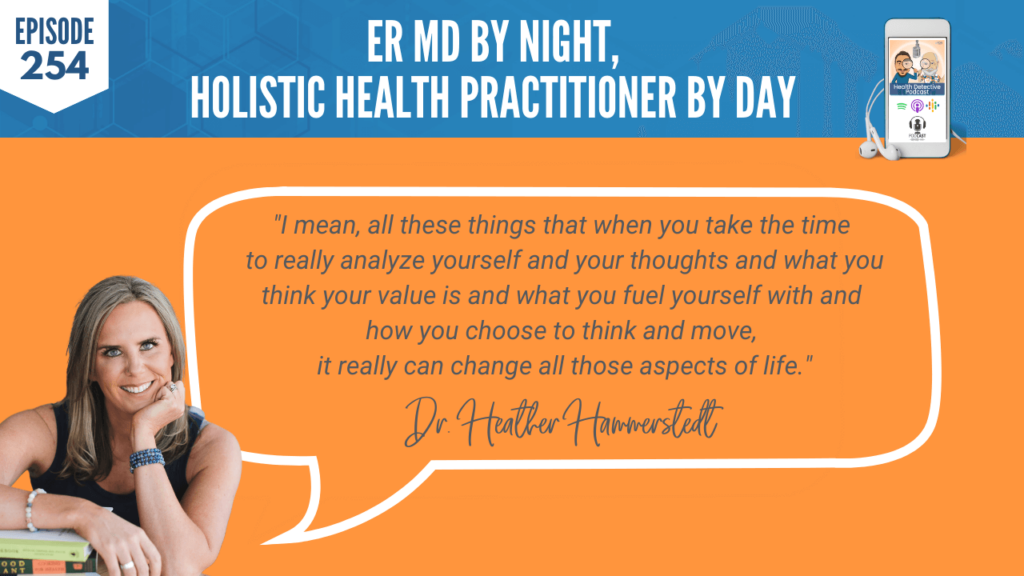
I mean, all these things that when you take the time to really analyze yourself and your thoughts and what you think your value is and what you fuel yourself with and how you choose to think and move, it really can change all those aspects of life. And those are definitely the most fun wins.
I don’t support divorce. I just want to say.
[00:42:56] Detective Ev: I was about to say, it’s like I came in to lose a few pounds; I lost my husband.
[00:43:01] Dr. Heather Hammerstedt: But I was very proud of all those movements, anything that anyone wants to do that they think is going to move them forward.
[00:43:06] Detective Ev: Again, that’s one of those things. It’s the second time today I said this, but it’s a whole podcast in and of itself.
I won’t mention the name cause they’re actually someone who I know in real life. It’s not a family member, but someone I know in real life. Both of the people when they divorced, looked a thousand times healthier in six months. Like both of them got better, healthier, stronger, have everything that you can imagine. And it’s really interesting, because you get into these traps sometimes.
An ER MD: The Stress Obstacle
And I’m all for people trying to work it out, I would hope that I do that. But sometimes maybe you’re just not compatible or it’s been fricking 20 years and you guys are on completely different paths of growth.
Dr. Heather Hammerstedt: You’ve grown in different places. Yeah.
Detective Ev: Right. So, it’s just interesting to see how much that affects things. And one of those people, the reason I brought this up, is the person had tried the gastric bypass surgeries, all the weight loss pills, all this stuff, probably lost without exaggeration, 40 pounds within six months of the divorce and not in a clinically like scary way. It was like, they look great now.
And I’m like, how on earth could they have been doing all that stuff beforehand and then they do that, and then all of a sudden seemingly actually having worse habits than before, the body weight just kind of falls off? It is really interesting.

[00:44:10] Dr. Heather Hammerstedt: Stress, inflammation, and cortisol can be a big obstacle in a lot of different parts of our lives. That is for sure.
[00:44:17] Detective Ev: Yeah. Okay, so I want to rapid fire a few things here. It’s rare, honestly, that I get to talk to someone who is so involved both with Western and natural, so I find it fascinating. I have a signature question at the end, but a new question I want to start asking our Western folks cause it’s something that’s been on my mind lately.
I’m not particularly old, but as I get older, I’m like, I’ve really been blessed to heal a lot of things. Now I want to take it a step further and get with really intelligent prevention.
An ER MD: Intelligent Prevention
So, as a doctor, someone who actually knows Western medicine quite well, maybe it’s blood work, maybe it’s something else, what are some markers or tests that you would look at yearly for people to prevent certain things?
Cause I think a lot of the functional folks, we get too involved in the out-of-the-box labs. Which is great, I use those all the time. But I’m starting to realize even something like homocysteine, if I just get that measured, that could be a really wise thing for someone who has a family history of some heart issues on my dad’s side.
So, what are some things that people can measure for preventative stuff to see if something’s going awry?
[00:45:18] Dr. Heather Hammerstedt: Yeah, it’s a great question. I do think that there are probably a lot that are recommended. And as I was inferring to in my conversation with Reed earlier on Curating Your Health, is you have to make sure that you and your practitioner or physician are prepared on what to do with that result. Cause otherwise it’s a waste of time and can often make people more stressed if they don’t have a solution to what the problem is.
But I think thyroid’s always important. I think vitamin D is very important. A fasting insulin level is very important. CRP and homocysteine are really important. Vitamin B12 levels are probably important in most people. And then just kind of the basic CBC and comprehensive metabolic panel is probably where I would start.

And I think making sure that you’re staying up with those preventative screening exams, whether it’s prostate or mammograms, colonoscopy, at the ages that we’re recommending are important cause you can catch things really early.
An ER MD: Staying Objective
I have a friend who’s my age, mid-forties, has stage four colorectal cancer right now. It’s just one of those things that those screening exams while annoying to have to keep up with, really can catch things before they’re that bad.
[00:46:38] Detective Ev: Yeah. That’s a new thought for me that I keep going back to. And that’s why I want to start asking those types of questions on the show when I’m lucky enough to have someone who could answer it.

Because a lot of these people that listen, we actually have overcome crazy health stuff. So, I’m thinking the last thing we’d ever want to do is get sick again. And sometimes we can almost be in a fear mindset. Like, I don’t want to see the labs. I feel good, I hope I’m good. I’m assuming I’m good. It’s like, dude, you’re probably way better off than you were when you started, and you know that.
So, I need to be objective, I need to look at the labs. I ran some blood work in the beginning of the pandemic, and I felt great, but I still had some things to work on. I actually realized my homocysteine was a little high. My vitamin D of all things was a little low considering how good I am with the sun exposure, so that was something else. There were some other markers as well that were just rather interesting to me. Nothing crazy, but that’s the point.
I can see it now. I have some action steps to take to do something about it and I’m due to get it checked probably pretty soon. So, I’m going to go do that. Thank you for that answer.
An ER MD: Recommending Books
Second to last rapid-fire question is, you already mentioned a couple of books. I’m not sure if this would be the answer to this, but as someone who is as well read as you are, what’s a really great book that you would recommend to our practitioners?
[00:47:50] Dr. Heather Hammerstedt: Well, my favorite book of all time is called Cutting for Stone. It has nothing to do with what we’re talking about tonight, but it is written about a physician 50, 60 years ago in Africa. And it’s a beautiful story. It is so well written. So, I always recommend everyone read that.
And let’s see, in terms of food related stuff, I think How Not to Die is an excellent book by a lifestyle medicine physician. That comes with a cookbook, which I think is great. It’s all plant-based, lifestyle, medicine-based stuff.

And then Dr. Fung wrote a book about The Complete Guide to Intermittent Fasting, which I think is really interesting if anyone is interested in figuring out how practically fasting works. Again, I could come on for a whole hour and talk about the physiology about fasting and how it can really help with a lot of parts of our lives. Especially in terms of weight management, but also gut microbiome and serotonin and dopamine levels and everything else.
Practically, this is a great book to be like, what do I even do to schedule that in. But also, just think I’m not eating instead of making a plan of how I’m going thoughtfully eat as much as I need to eat within a smaller window. So, I think, that would be my three answers.
An ER MD: Signature Podcast Question
[00:49:11] Detective Ev: Sure. And then the signature question on the Health Detective Podcast, kind of would fall in line with the book to a degree, but a little different. The question is, if we could give you a magic wand, in this case it would be you, and you could get every single person in this world to either do one thing for their health, or you can get us all to stop doing one thing for our health, what’s the one thing that you’d get us all to do?
[00:49:33] Dr. Heather Hammerstedt: Oh geez. You’re going to get two. Can I give two answers?
[00:49:37] Detective Ev: Sure, you certainly can. I’ve had three sometimes, actually.
[00:49:38] Dr. Heather Hammerstedt: Okay, so I’m going to wear my two hats.

My Wholist hat is I want everyone to just start eating more plants and have meat be a garnish. And my emergency medicine hat says like, please stop doing fentanyl and meth.
Those are two very different answers, but both very important.
[00:50:00] Detective Ev: Yeah, ideally, hopefully the folks here, but you never know. You never discriminate. So, if you are an FDN doing meth, we advise you to stop.
Dr. Heather Hammerstedt: Please, stop.
Detective Ev: Please stop very quickly. Yes.
Where to Find Dr. Heather Hammerstedt
Where can people find all your stuff? You got a variety of things going on. So, where can they find you if they’d like to get connected?
[00:50:14] Dr. Heather Hammerstedt: We’re at wholisthealth.com. We have information there, a plant-based 30-day transformation challenge there, a way to get in touch with us about our weight wellness and mental fitness programs.
If you’re a physician or a practitioner or an FDN practitioner that you want to partner with us to work together, we have information there as well about how to do that. And we can hop on the phone and chat.

I have a Facebook group called Midlife Wellness Collective that’s on Facebook. There’s about 10,000 of us there. I have a podcast called Curating Your Health, where I interview people all the time in the healthcare world about what do you wish everyone knew about what you did. It’s really fun from an educational perspective. And then on Instagram I’m at MamaEmDoc and at Wholisthealth.
[00:51:04] Detective Ev: Fantastic. Thank you so much for being here with us today, especially recording with me on a Friday. You are one of the first people to show up on a Friday night to do this, so I appreciate you.
[00:51:11] Dr. Heather Hammerstedt: When you work nights and random shifts like this, it is like any other day.
Detective Ev: I was about to say.
Dr. Heather Hammerstedt: Yeah, this could be morning for all you know.
[00:51:19] Detective Ev: Thank you so much.
Dr. Heather Hammerstedt: Yeah, you’re welcome.
Conclusion
You can always visit us at functionaldiagnosticnutrition.com. Our Instagram handle is @fdntraining.
For more informational and functional health-oriented podcasts like this one, go to functionaldiagnosticnutrition.com/health-detective-podcast/.
To learn more about us, go to functionaldiagnosticnutrition.com/about-fdn-functional-testing/.

